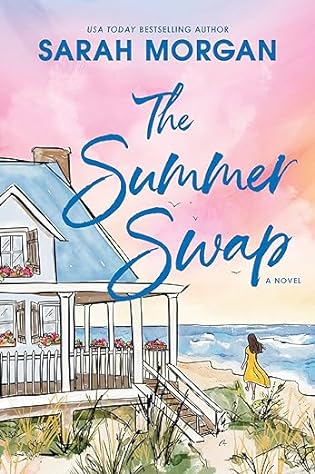 The Summer Swap by Sarah Morgan
The Summer Swap by Sarah Morgan Format: eARC
Source: supplied by publisher via Edelweiss
Formats available: hardcover, paperback, ebook, audiobook
Genres: Chick Lit, contemporary romance, relationship fiction, women's fiction
Pages: 336
Published by Canary Street Press on May 7, 2024
Purchasing Info: Author's Website, Publisher's Website, Amazon, Barnes & Noble, Kobo, Bookshop.org, Better World Books
Goodreads
"The perfect summer novel—sharp, smart and so much fun!" —Viola Shipman, USA TODAY bestselling author, on The Island Villa
Cecilia Lapthorne always vowed she’d never go back to Dune Cottage. So no one is more surprised than Cecilia to find herself escaping her own seventieth birthday party to return to the remote but beautiful cottage on Cape Cod—a place filled with memories. Some are good—especially memories of the early days with her husband, volatile artist Cameron, before his fame eclipsed their marriage. But then there are the memories she has revealed to no one. Especially not her daughter, Kristen, who hero-worshipped her father.
For aspiring artist Lily, Dune Cottage has been a refuge, albeit an illicit one. After dropping out of medical school, she’s cleaning houses on the Cape to get by, guilt-ridden for disappointing her parents. Unoccupied for years, the cottage seemed the perfect place to hide away and lick her wounds—until Cecilia unexpectedly arrives. Despite an awkward beginning, Lily accepts Cecilia’s invitation to stay on as her guest, and a flicker of kinship ignites.
Then Cecilia’s grandson, Todd—and Lily’s unrequited crush—shows up, sending a shock wave through their unlikely friendship. Will it inspire Lily to find the courage to live the life she wants? Can Cecilia finally let go of the past to find a new future? Because as surely as the tide erases past footprints, this summer is offering both Cecilia and Lily the chance to swap old dreams for new…
My Review:
There’s a saying about the best things to give children are “roots and wings”. Roots to ground them, and wings to fly free. The Summer Swap is a story about, not just those roots and those wings, but particularly about the way that family expectations can add so much ballast that those wings can’t lift their load – no matter how much they yearn to fly.
The story begins with Lily, who has literally fled her parents’ well-meaning but wrong-headed expectations. Her parents worked hard and sacrificed a lot to make their two middle-class but not highly compensated jobs stretch – with grants and scholarships – to get Lily into an elite private school, college and then medical school.
They wanted her life to be richly rewarded and financially secure and put every penny and every effort into making it happen. That her rich and snooty classmates saw Lily as a charity case and treated her accordingly was something Lily stuffed down deep inside – just as she buried her dreams of becoming an artist in favor of pursuing the practical medical degree her parents had scrimped and saved for – and seemed to have their hearts set on.
Until it broke her, and she dropped out of med school. At which point her parents broke her again and kept on doing it, smothering her with their anxiety and their concern and trying to find ways to fix her so that she could go back to school – which was the last thing she wanted.
Her parents meant well, and they did their best to do well. But their dreams weren’t her dreams and she couldn’t deny herself a minute longer so she left. When we meet her she’s cleaning expensive but empty bungalows on Cape Cod, giving herself a bit of mental space so she can figure out what she wants to do with her OWN life while finding a way to manage those heavy parental expectations.
While squatting in an empty bungalow because it’s tourist season and there’s no place around that she can afford to live in on the trendy, touristy, expensive Cape.
Which is where Cecilia Lapthorne comes in. Literally.
Cecilia, seventy-five years old and the recent widow of a larger-than-life artist, has let herself be effaced by the expectations of being the “great man’s” helpmeet while he wowed the masses and kept his name in the limelight. Now that he’s gone, her daughter’s expectations that she continue to serve her artist dad’s memory and legacy for the rest of her life are smothering her.
So she too runs away – to the “cottage” on Cape Cod where she and her late husband had some of their happiest – and one of the awfullest – times of their lives. Because she needs that same bit of mental space that Lily does – to figure out what she wants to do with the rest of HER OWN life.
Which is the point where Lily and Cecilia run into each other. They can give each other something that few seem to have given either of them – time and space to think, and an open mind and a listening ear to help them each think through the life ahead of them as well as the trials and errors behind them.
And in that open space, they are able to capture the dreams they left behind and move forward into brighter futures – no matter how many years they each might have ahead.
 Escape Rating A-: I picked this up because I absolutely fell in love with The Summer Seekers and was looking for the same kind of multi-threaded, multi-generational story about women at different milestones in their lives and the ways that they navigate the ties that bind and the ties that strangle – whether they are related to each other or not.
Escape Rating A-: I picked this up because I absolutely fell in love with The Summer Seekers and was looking for the same kind of multi-threaded, multi-generational story about women at different milestones in their lives and the ways that they navigate the ties that bind and the ties that strangle – whether they are related to each other or not.
There are three women tangled together in this story, just as there were in The Summer Seekers. Cecilia, her middle-aged daughter Kristen, and 20something Lily. Cecilia and Kristen’s relationship is strained – frankly most of their relationships are strained for interconnected reasons – and Lily’s relationship with her parents is fraught as well.
What makes the interconnectedness work is that the strain in all of the relationships is wrapped around the same issue – each of them is protecting someone else by keeping secrets that probably should have seen the light of day years ago but haven’t for reasons that are realistically human.
And are also wrapped up in the female condition – that if you are female those around you (including, unfortunately, other women) often believe that you don’t know your own mind or haven’t thought things through or are being overly emotional. Something that’s especially true for Lily – her parents are sure that she’s too young to know her own mind and they only want what’s best for her. But equally true for Cecilia, who is seventy-five and recently widowed. Her daughter Kristen is just as sure that it’s her mother’s grief talking and she really isn’t in a position to make big decisions about her own life and that it will all look better later and that Kristen is just being protective and really knows best. When in fact Kristen is actually trying to manage her own grief over her father’s death by managing her mother – so of course it’s not working AT ALL for either of them.
Then again, Kristen is one of those people who ALWAYS knows best and is constantly managing everyone around her to make sure that her ‘best’ decisions are the ones that get implemented – never realizing that it often happens because it’s less stress for others to let her handle things rather than get bulldozed out of the way. Which explains at lot about the strain in all of the rest of Kristen’s relationships as well.
This particular triptych, similar to the triad relationship in The Summer Seekers, (I REALLY loved that book!), is something that this author is particularly adept at. (It worked a bit less well in The Book Club Hotel with four instead of three and YMMV)
All three women have similar issues, in that they need to stop trying to manage other people’s emotions, responses and expectations and set boundaries on their own – particularly with each other in the case of Cecilia and Kristen.
 I did figure out Cecilia’s big secret fairly early on – but there was still an impact in seeing it revealed to the others and the way in which it was revealed. At the same time I was never quite sure exactly what the stumbling block was in Lily’s romance but was happy to see her happy all the same. And I was thrilled to see Cecilia get her own second-time-around HEA because she’d earned it, deserved it and was utterly entitled to it. I left the story still not sure how to characterize Kristen’s progress – but on the other hand, I’m not sure she is yet either.
I did figure out Cecilia’s big secret fairly early on – but there was still an impact in seeing it revealed to the others and the way in which it was revealed. At the same time I was never quite sure exactly what the stumbling block was in Lily’s romance but was happy to see her happy all the same. And I was thrilled to see Cecilia get her own second-time-around HEA because she’d earned it, deserved it and was utterly entitled to it. I left the story still not sure how to characterize Kristen’s progress – but on the other hand, I’m not sure she is yet either.
If you enjoy stories like this, stories where women are at the center of all the action as well as all the emotions, where a romance may occur but isn’t remotely the entirety of the point, or simply like spending time with women who you’d love to have coffee with after, or simply books where you can feel the summer breeze wafting by as you read, The Summer Swap is just the ticket. And if one summer book is not enough, don’t forget to pick up this author’s other terrific ‘beach reads’ The Summer Seekers AND Beach House Summer to extend the breeze of your summer reading vibe!

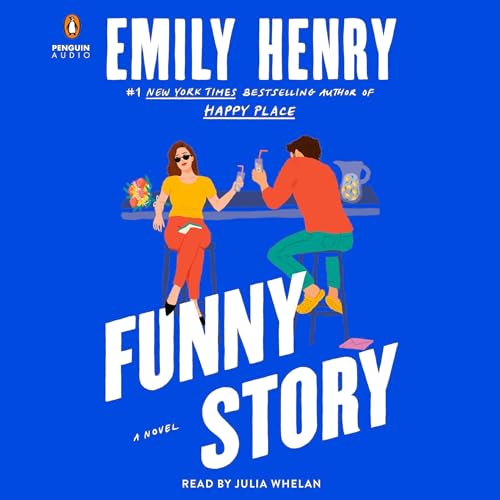 Funny Story by
Funny Story by 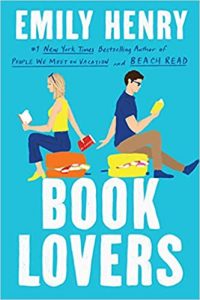 Escape Rating A: I started out listening to this one, and that’s probably what got me over the hump of the early chapters. This is one of those stories that, of necessity, has a very hard start. We meet Daphne just after very nearly the entire life she had planned crashed and burned. She’s wallowing in a whole lot of angst and regret and self-recrimination, nearly buried by the weight of her emotional baggage piling up all around her. Listening to the excellent narrator makes the listener feel like they are literally inside Daphne’s mostly despairing head and it’s a realistically well-portrayed terrible place to be.
Escape Rating A: I started out listening to this one, and that’s probably what got me over the hump of the early chapters. This is one of those stories that, of necessity, has a very hard start. We meet Daphne just after very nearly the entire life she had planned crashed and burned. She’s wallowing in a whole lot of angst and regret and self-recrimination, nearly buried by the weight of her emotional baggage piling up all around her. Listening to the excellent narrator makes the listener feel like they are literally inside Daphne’s mostly despairing head and it’s a realistically well-portrayed terrible place to be.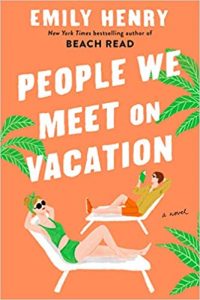 That Peter ultimately gets the shaft all the way around turned out to be merely the icing on a very tasty cake of a book – or perhaps that should be the slathering of cheese and jalapenos on a fresh, hot serving of Petoskey fries. The part that makes a good thing just that much better.
That Peter ultimately gets the shaft all the way around turned out to be merely the icing on a very tasty cake of a book – or perhaps that should be the slathering of cheese and jalapenos on a fresh, hot serving of Petoskey fries. The part that makes a good thing just that much better.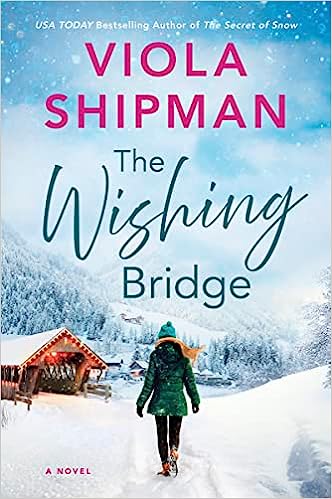 The Wishing Bridge by
The Wishing Bridge by 

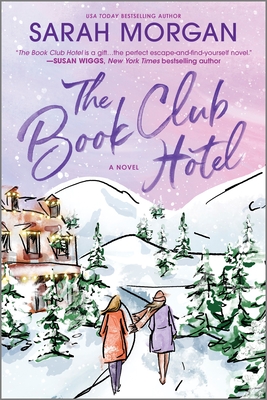 The Book Club Hotel by
The Book Club Hotel by  Escape Rating B+: I picked this up for two reasons, and I’m not sure which is first or second. The whole concept of a vacation just to read and spend time with lifelong friends and read, (did I mention read?) and relax and oh, yes, read – sounds a bit like heaven. And the setting of The Book Club Hotel seemed particularly idyllic, including a brief trip to a ‘Winter Wonderland’ without having to stick around for the next several months of freezing temperatures, gray snow and mud. (Been there, done that, the t-shirts are all long-sleeved and insulated.)
Escape Rating B+: I picked this up for two reasons, and I’m not sure which is first or second. The whole concept of a vacation just to read and spend time with lifelong friends and read, (did I mention read?) and relax and oh, yes, read – sounds a bit like heaven. And the setting of The Book Club Hotel seemed particularly idyllic, including a brief trip to a ‘Winter Wonderland’ without having to stick around for the next several months of freezing temperatures, gray snow and mud. (Been there, done that, the t-shirts are all long-sleeved and insulated.)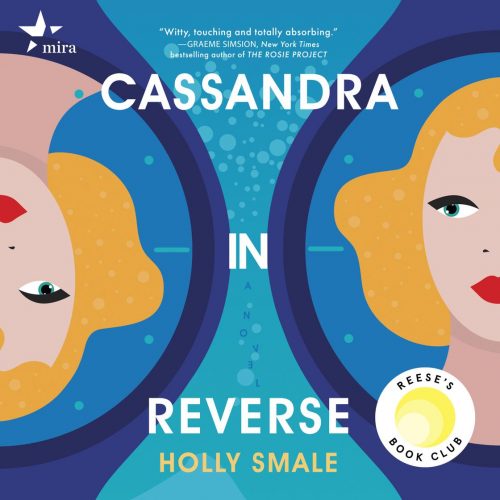 Cassandra in Reverse by
Cassandra in Reverse by 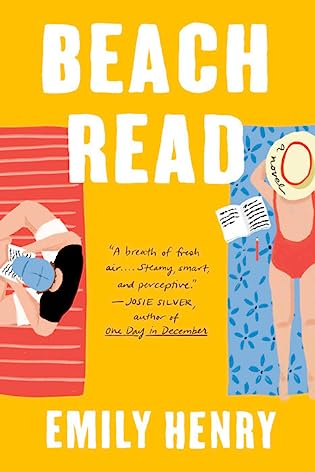 Beach Read by
Beach Read by 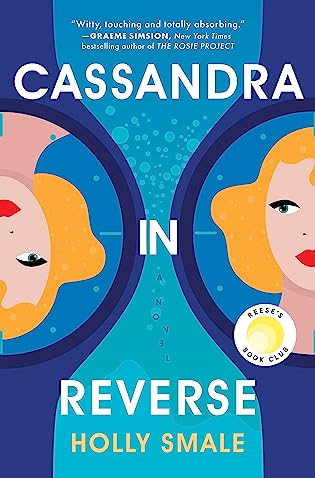 Cassandra in Reverse by
Cassandra in Reverse by 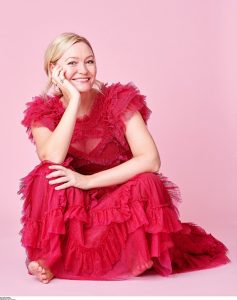 About the Author:
About the Author:
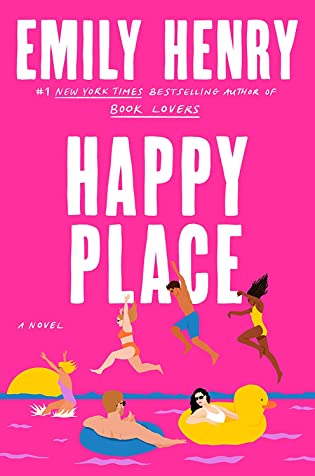 Happy Place by
Happy Place by 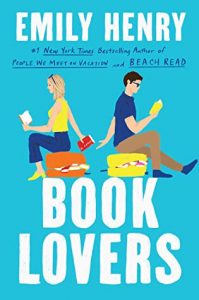 Escape Rating B+: I went into Happy Place hoping for another
Escape Rating B+: I went into Happy Place hoping for another 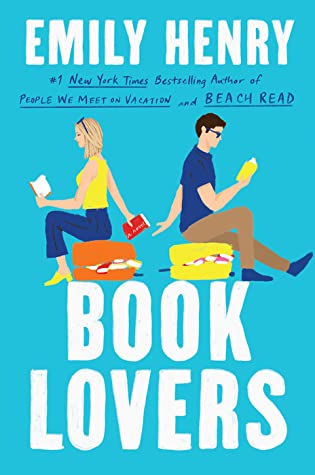 Book Lovers by
Book Lovers by 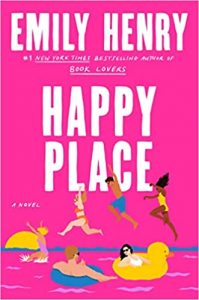 Two years later, unbeknownst to each other, in the middle of trips that they’ve each been separately strong-armed into, they run into each other in the tiny town of Sunshine Falls, NC, to discover that their enmity isn’t really all that strong, but their bantering snarkitude is excellent.
Two years later, unbeknownst to each other, in the middle of trips that they’ve each been separately strong-armed into, they run into each other in the tiny town of Sunshine Falls, NC, to discover that their enmity isn’t really all that strong, but their bantering snarkitude is excellent.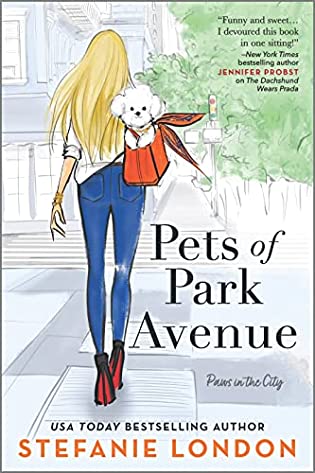 Pets of Park Avenue (Paws in the City, #2) by
Pets of Park Avenue (Paws in the City, #2) by 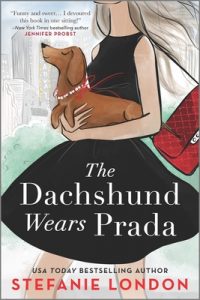 This followup to
This followup to 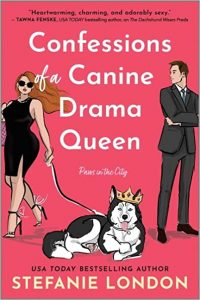 But they also kind of aren’t. Or at least, they didn’t intend to be. But what they meant versus what they said and how they said it, how much they saw AND treated Scout as if she was a carbon copy of her mother, sent their relationship and Scout herself off in some terrible directions that she spends the whole story dealing with.
But they also kind of aren’t. Or at least, they didn’t intend to be. But what they meant versus what they said and how they said it, how much they saw AND treated Scout as if she was a carbon copy of her mother, sent their relationship and Scout herself off in some terrible directions that she spends the whole story dealing with.